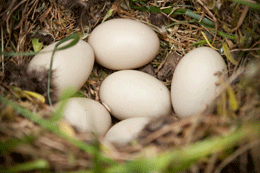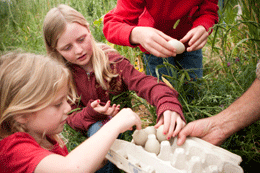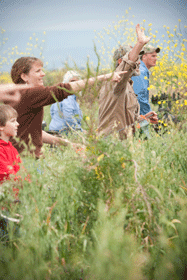Duck Egg Rescue
Air Date: Week of May 22, 2009

Rescuing duck eggs from crop cover. (Photo: Brent Holland, Blue Lab Media)
Many farmers plant cover crops to fortify soil and hold it in place. But tall growth attracts nesting birds. But as Beth Hoffman reports, one organic rice farm in California organizes an annual egg rescue and finds homes to hatch the ducklings.
Transcript
CURWOOD: Now greener cars may help save the planet, but every day gas-guzzlers and hybrids alike kill thousands of wild animals.
Agriculture also has its own version of road kill. If creatures nest in plantings, they face disaster when farm machines come through. Ducks are especially fond of nesting in vetch, that’s a cover crop many farmers plant to boost soil nitrogen, and nests often get crushed.
But one family farm in the Sacramento Valley has found a solution. Just before it’s time to turn the soil in the spring, an army of volunteers retrieves as many eggs as possible. It’s called 'Egg Aid', and this year, reporter Beth Hoffman went along.
[CROWD SOUNDS]
VOICE OVER LOUDSPEAKER: If everyone, if everybody will gather around here…
HOFFMAN: Egg Aid is a little like the biggest, hardest Easter egg hunt you've ever done. It takes place in the overgrown rice fields of Lundberg Family Farms. This year about forty kids and twenty adults came out for the search.
LUNDBERG: (over megaphone) Now I just would like to make a little identification for you about what some of these cover crops are…
HOFFMAN: But today the kids don’t only learn about duck eggs. They also hear about growing rice organically, as the Lundbergs do. Bryce Lundberg holds up a tall plant with yellow flowers for the crowd of squirmy kids to see.
LUNDBERG: (over megaphone) That one there might be something you put on a hamburger or hot dog besides ketchup. Something yellow. What might that be?
KID: Mustard
LUNDBERG: (over megaphone) Mustard – that’s right.
HOFFMAN: The Lundbergs and other organic farms don’t just plant a cover crop for winter. They let the mustard and vetch grow in the fallow field for a whole year. By that time it’s three or four feet high, and provides great cover for ducks to lay their eggs.
KERHOULAS: (over megaphone) There are a lot of eggs and a lot of nests in this field and you’re going to be surprised how hard some of them are to find.
HOFFMAN: This is Gary Kerhoulas, a volunteer organizer for Egg Aid. The idea for the egg search is to startle the ducks, then make your way to where the hen took off and look for a nest. The kids all grab hold of a long rope, strung with coffee cans full of rocks. Four wheel ATVs come up behind, carrying empty egg cartons. Then Kerhoulas gives the go ahead.

Children prepare for the rescue mission. (Photo: Brent Holland, Blue Lab Media)
[NOISE OF CANS]
HOFFMAN: The kids walk and shake the rope as they go. The noise is deafening, and it’s a wonder every duck for a hundred miles doesn’t immediately fly away. But they don’t, and only when the line gets close do they suddenly shoot off.
BOY: Look on the ground, there are going to be eggs over here.
HOFFMAN: The kids search in the cover, gently moving the chest high brush aside.
[KIDS YELLING]
KID: Oh, my God!
[SOUND OF KIDS LOOKING FOR EGGS, THEN CHEERING]
CROWD: We found them. Woah! Way to go John!
[CLAPPING]
KID: We found a big one!
HOFFMAN: It’s thrilling to find a nest, the eggs slightly blue, and still warm. A soft layer of down covers them, and the kids pick them up and gently put them in the egg carton.
[MORE SOUNDS OF EXCITEMENT, FINDING NESTS]
FATHER: Do you want to pick them up and hand them to me?
GIRL: Yeah, yeah, yeah
FATHER: Okay, gently, just like our chicken eggs.

Children place their findings in an egg carton for safe transport. (Photo: Brent Holland, Blue Lab Media)
LUNDBERG: And we felt almost guilty of destroying those eggs, but there was nothing we could do about it. And so we started having the men on the tractors carrying these egg cartons, but it got really more than they could do.
HOFFMAN: So a wheat farmer who lived near by – Darrel Daly – came up with the idea of saving eggs, and began hatching them at his home. Now in fact his main work is the hatchery.
DALY: I was running a wheat harvester and I ran over a mallard nest, smashed about half the eggs and I took them home and hatched out four and released them into the wild. And then the next year the neighbors would come with a hat full of eggs, and from four it’s turned into some years over 2000.
[SOUND OF CANS]
HOFFMAN: By lunchtime the kids were tired and hungry. But they had also found lots of eggs.
GIRL: A little girl found a nest of six.
GIRL: And we found a nest of black birds too.
GIRL: Three of them.
HOFFMAN: It is hard to say whether the excitement of finding duck eggs will turn these kids into supporters of organic food. But eleven-year-old Lexi sounds like she’ll remember this day for a while.
LEXI: I was really excited. I was like “Oh my gosh, I found the eggs!” And we all got to pick up the eggs and feel how warm they were and stuff. Yeah, I learned that you could save lives, really easily. Yeah, that was really exciting for me.

Scaring away the ducks. (Photo: Brent Holland, Blue Lab Media)
[MUSIC: Andrew Bird “Masterswarm” from Noble Beast (Wegawam Records 2009)]
YOUNG: Just ahead: batting clean-up for the green work force. Stay with us - on Living on Earth.
ANNOUNCER: Support for the Environmental Health Desk at Living on Earth comes from the Cedar Tree Foundation. Support also comes from the Richard and Rhoda Goldman fund for coverage of population and the environment. And from Gilman Ordway for coverage of conservation and environmental change. This is Living on Earth on PRI, Public Radio International.
[CUTAWAY MUSIC: Spyro Gyra: “A Distant Memory” from Down the Wire (Heads Up 2009)]
Links
Living on Earth wants to hear from you!
Living on Earth
62 Calef Highway, Suite 212
Lee, NH 03861
Telephone: 617-287-4121
E-mail: comments@loe.org
Newsletter [Click here]
Donate to Living on Earth!
Living on Earth is an independent media program and relies entirely on contributions from listeners and institutions supporting public service. Please donate now to preserve an independent environmental voice.
NewsletterLiving on Earth offers a weekly delivery of the show's rundown to your mailbox. Sign up for our newsletter today!
 Sailors For The Sea: Be the change you want to sea.
Sailors For The Sea: Be the change you want to sea.
 The Grantham Foundation for the Protection of the Environment: Committed to protecting and improving the health of the global environment.
The Grantham Foundation for the Protection of the Environment: Committed to protecting and improving the health of the global environment.
 Contribute to Living on Earth and receive, as our gift to you, an archival print of one of Mark Seth Lender's extraordinary wildlife photographs. Follow the link to see Mark's current collection of photographs.
Contribute to Living on Earth and receive, as our gift to you, an archival print of one of Mark Seth Lender's extraordinary wildlife photographs. Follow the link to see Mark's current collection of photographs.
 Buy a signed copy of Mark Seth Lender's book Smeagull the Seagull & support Living on Earth
Buy a signed copy of Mark Seth Lender's book Smeagull the Seagull & support Living on Earth

